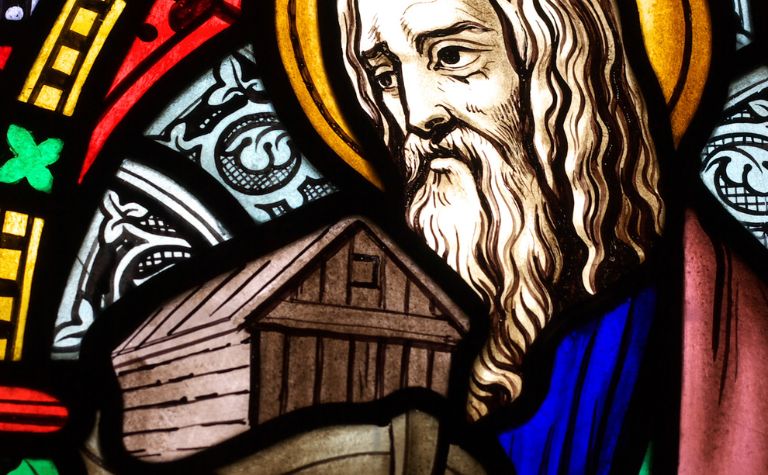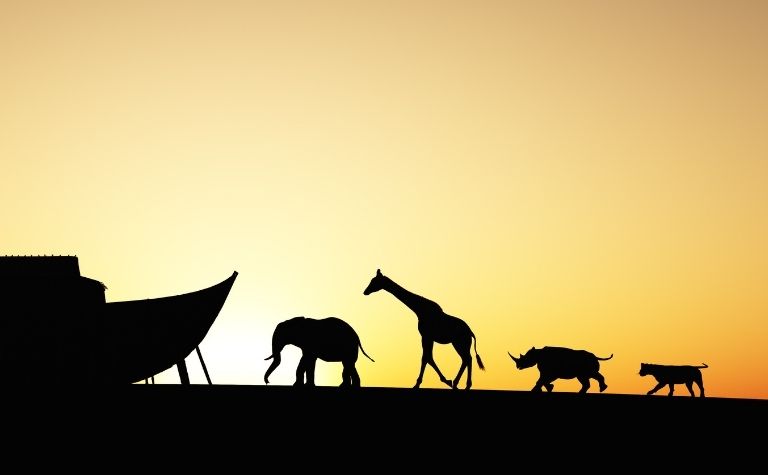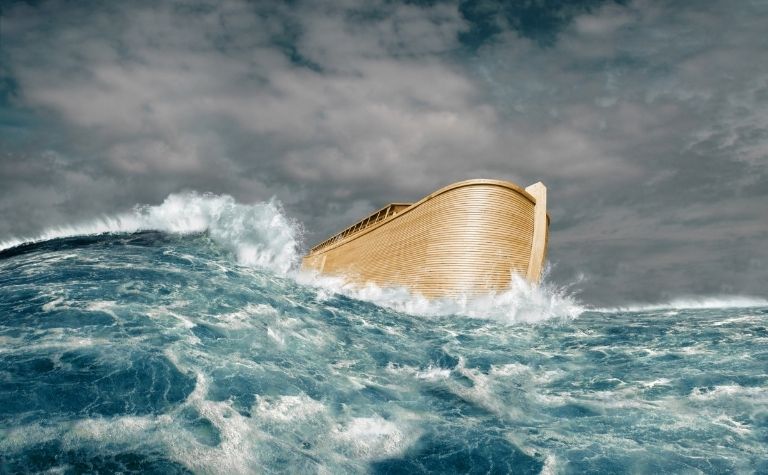Noah is a central figure in the book of Genesis. The New Testament praises his faith (Heb. 11:7), which he demonstrated in the story of the flood that God sent to destroy the earth. Because Noah is such a towering figure in Genesis and plays a central role in one of the most fascinating and important stories in the Bible, readers often want to know a lot about him, including his family.
Noah had one wife, according to the book of Genesis in the Old Testament and 2 Peter in the New Testament. She is referred to in the flood story but never named. The most popular traditional identity of Noah’s wife is Naamah (Gen. 4:22). Yet even non-biblical sources say Noah had just one wife.
Where does the Bible mention Noah’s wife? Where does the New Testament mention Noah’s wife? What does the Bible say about Naamah? Why do some think she was Noah’s wife? What does Genesis say about Shem, Ham, and Japheth? Keep reading to learn the answers to these questions and others.
Also see How Old Was Noah When He Built the Ark? to learn more.

Where does the Bible mention Noah’s wife?
God told Noah to take his wife, and his sons, on the ark. “Go into the ark, you and all your household, for I have seen that you are righteous before me in this generation” (Gen. 7:1).
When floodwater began covering the world, Noah’s family boarded the ark. This time, Genesis mentions Noah’s sons, their names, and his wife, but not her name.
“On the very same day Noah and his sons, Shem and Ham and Japheth, and Noah’s wife and the three wives of his sons with them entered the ark” (Gen. 7:13).
| Hebrew word | אִשָּׁה |
| Translation | woman, wife, female |
| Singular or plural | singular; “wife” |
| Transliteration | ishshah |
| Part of speech | feminine noun |
| Pronunciation | ish-shaw’ |
The Bible never mentions the names of Shem, Ham, and Japheth’s wives.
The flood story mentions Noah’s wife and sons again in its description of God destroying life on the earth. “He blotted out every living thing that was on the face of the ground, man and animals and creeping things and birds of the heavens. They were blotted out from the earth. Only Noah was left, and those who were with him in the ark” (Gen. 7:23).
After the floodwaters dried, Genesis says that Noah’s family left the ark with him. “Go out from the ark, you and your wife, and your sons and your sons’ wives with you” (Gen. 8:16).
Also see How Long Did It Take Noah to Build the Ark? to learn more.

Does the New Testament mention Noah’s wife?
Peter mentions that there were seven other people on the ark with Noah, corroborating the passenger list in the flood story in Genesis. He writes, “If [God] did not spare the ancient world, but preserved Noah, a herald of righteousness, with seven others, when he brought a flood upon the world of the ungodly” (2 Pet. 2:5). This number implies that Noah had just one wife on the ark.
| Number | Passenger |
|---|---|
| 1 | Noah |
| 2 | Noah’s wife |
| 3 | Shem |
| 4 | Shem’s wife |
| 5 | Ham |
| 6 | Ham’s wife |
| 7 | Japheth |
| 8 | Japheth’s wife |
Also see When Did Noah Build the Ark? to learn more.

Was Naamah Noah’s wife?
The Bible doesn’t say that Naamah was Noah’s wife. Naamah was the daughter of Lamech and Zillah and the brother of Tubal-Cain. Genesis 4:22 reads, “Zillah also bore Tubal-cain; he was the forger of all instruments of bronze and iron. The sister of Tubal-cain was Naamah” (ESV).
Some Genesis scholars wonder why the passage mentions Naamah as other women are implied but not named (Gen. 4:17-22). What is special about Naamah? The text doesn’t say. Its silence has led some to believe that her significance may be that she was Noah’s wife.
What does Genesis reveal about Shem?
Shem was the second son of Noah. Genesis implies that he was 98 years old when the flood occurred. “These are the generations of Shem. When Shem was 100 years old, he fathered Arpachshad two years after the flood” (Gen. 11:10).
After he fathered Arpachshad, Shem lived another 500 years before he died at the age of 600. “And Shem lived after he fathered Arpachshad 500 years and had other sons and daughters” (Gen. 11:11).
The family line of Shem
In his prophecy regarding future generations, Noah revealed that Japheth’s descendants would live in the tents of Shem, while the Canaanites of Ham’s line wouldn’t.
Genesis 9:25-27 read, “Cursed be Canaan; a servant of servants shall he be to his brothers. He also said, Blessed be the Lord, the God of Shem; and let Canaan be his servant. May God enlarge Japheth, and let him dwell in the tents of Shem, and let Canaan be his servant.”
The Table of Nations mentions Shem’s descendants. Genesis 10:21-22 read,
- 21 To Shem also, the father of all the children of Eber, the elder brother of Japheth, children were born.
- 22 The sons of Shem: Elam, Asshur, Arpachshad, Lud, and Aram.
- 23 The sons of Aram: Uz, Hul, Gether, and Mash.
- 24 Arpachshad fathered Shelah; and Shelah fathered Eber.
- 25 To Eber were born two sons: the name of the one was Peleg, for in his days the earth was divided, and his brother’s name was Joktan.
- 26 Joktan fathered Almodad, Sheleph, Hazarmaveth, Jerah,
- 27 Hadoram, Uzal, Diklah
- 28 Obal, Abimael, Sheba
- 29 Ophir, Havilah, and Jobab; all these were the sons of Joktan.
- 30 The territory in which they lived extended from Mesha in the direction of Sephar to the hill country of the east.
- 31 These are the sons of Shem, by their clans, their languages, their lands, and their nations.
Also see How Long Was Noah In the Ark? to learn more.
What does Genesis reveal about Japheth?
Genesis refers to Japeth as older than Shem. “To Shem also, the father of all the children of Eber, the elder brother of Japheth, children were born” (Gen. 10:21).
Nevertheless, he appears third in some lists of Noah’s sons, like Genesis 6:10, “And Noah had three sons, Shem, Ham, and Japheth” and 9:18, “The sons of Noah who went forth from the ark were Shem, Ham, and Japheth. (Ham was the father of Canaan).”
Like his brothers, Japheth survived the flood (Gen. 7:7). He also helped Shem cover up Noah’s nakedness after the flood (Gen. 9:20-27).
The family line of Japheth
His descendants lived in the tents of Shem, unlike Ham’s (Gen. 9:27). Scholars believe his descendants occupied the isles of the Gentiles, Hellenes, or Greeks, including Asia Minor and northern Greece (Gen. 10:5). [5] The Table of Nations includes the descendants of Japheth. Genesis 10:2-5 reads:
- 2 The sons of Japheth: Gomer, Magog, Madai, Javan, Tubal, Meshech, and Tiras.
- 3 The sons of Gomer: Ashkenaz, Riphath, and Togarmah.
- 4 The sons of Javan: Elishah, Tarshish, Kittim, and Dodanim.
Verse five reads, “From these the coastland peoples spread in their lands, each with his own language, by their clans, in their nations.”
What does Genesis reveal about Ham?
Ham was Noah’s youngest son. He was probably born about 96 years before the flood. [4] Ham was the father of the Egyptians, Ethiopians, Libyans, and Canaanites.
The Canaanites play an important role in the Old Testament because they resided in the land that God promised Abraham’s descendants. The Canaanites rejected the God of the Israelites, which created problems for centuries.
The Old Testament sometimes uses the name “Ham” as a reference to the Egyptians. For example, Psalm 78:51 reads, “He struck down every firstborn in Egypt, the firstfruits of their strength in the tents of Ham.”
The family line of Ham
The Table of Nations mentions Ham’s descendants. Genesis 10:6-14 reads,
- 6 The sons of Ham: Cush, Egypt, Put, and Canaan.
- 7 The sons of Cush: Seba, Havilah, Sabtah, Raamah, and Sabteca.
- The sons of Raamah: Sheba and Dedan.
- 8 Cush fathered Nimrod; he was the first on earth to be a mighty man.
- 9 He was a mighty hunter before the LORD. Therefore it is said, “Like Nimrod a mighty hunter before the LORD.”
- 10 The beginning of his kingdom was Babel, Erech, Accad, and Calneh, in the land of Shinar.
- 11 From that land he went into Assyria and built Nineveh, Rehoboth-Ir, Calah, and
- 12 Resen between Nineveh and Calah; that is the great city.
- 13 Egypt fathered Ludim, Anamim, Lehabim, Naphtuhim
- 14 Pathrusim, Casluhim (from whom the Philistines came), and Caphtorim.
Also see Who Helped Noah Build the Ark? to learn more.
References:
[1] Source
[2] Source
Related Questions
The Garden of Eden plays an important role in the early chapters of Genesis. God created Adam, planted the garden, and placed the first man in it (Gen. 2:8). God later created Eve and placed her in...
A serpent plays an important role in Genesis, the first book of the Bible, and in Revelation, the last book. Scripture also mentions them in other places in the Old and New Testaments that are...
